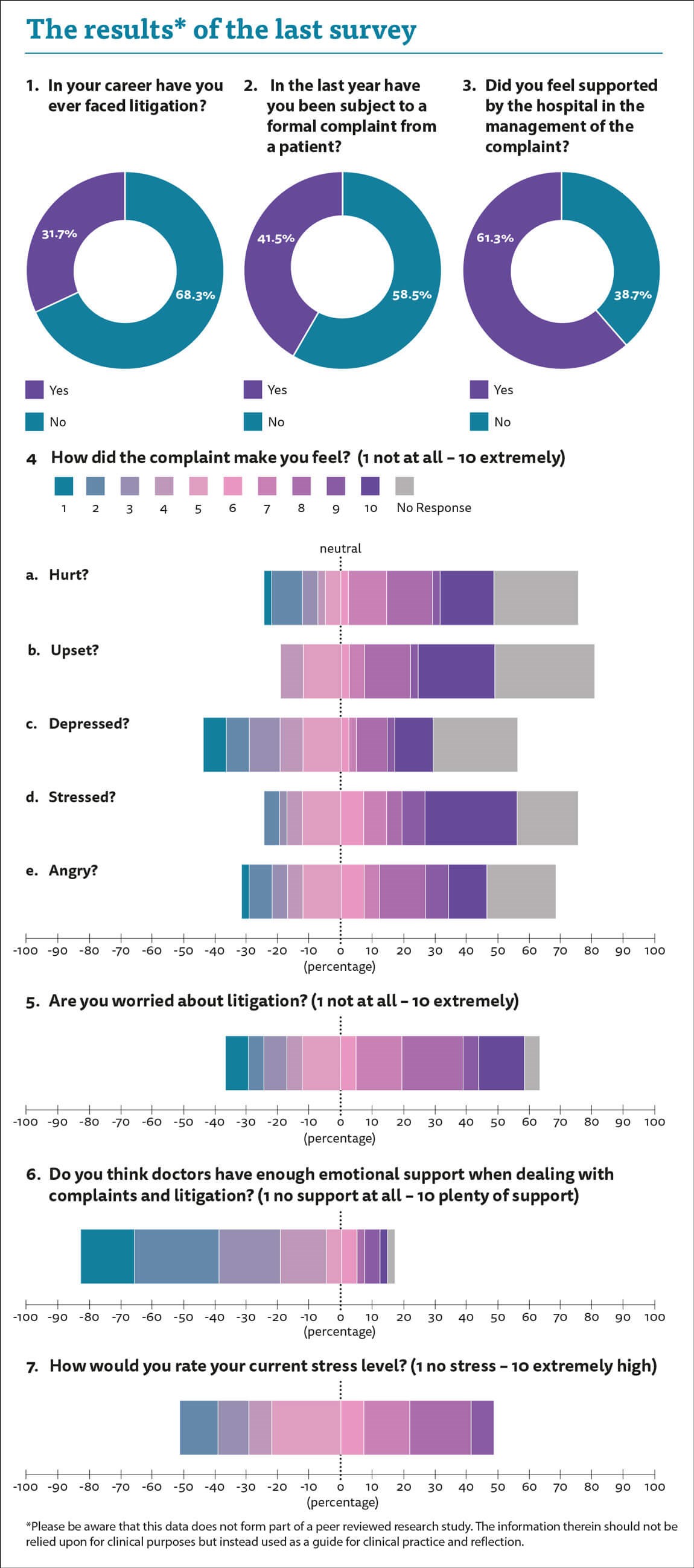
This edition’s survey took a slightly different tack and tried to look at the problems we face in litigation. Litigation is unpleasant. It is horrible being involved in it and the process of litigation can be extremely stressful. From the very beginning we are upset because a patient has come to harm, we are then potentially upset because the patient has sought to complain. Then we need to justify our conduct to our management and go through the painful process of an investigation. Finally, we have to deal with lawyers, participate in interviews and write statements.
Data obtained from NHS Resolution shows that clinical negligence claims in ophthalmology as a whole were estimated to cost between £25.3 and £52.1 million per year over the last five years [1].
Over five years there were 1208 claims related to alleged ophthalmology negligence. Considering there are approximately 1500 ophthalmologists in the UK, this means that all of us are likely to face litigation.
Whenever I teach about litigation or deal with clinicians who are involved in clinical negligence cases I always advise them not to take it personally, however, I was involved in a case where I felt I had done nothing wrong and I took it completely personally.
Approximately one third of respondents said they had been involved in litigation. Sadly, I fear those who responded ‘no’ have not been involved in litigation yet. I was really surprised to see that more than 40% of us have had a formal patient complaint against them in the last year. I am saddened by this figure. I was, however, gratified to see that almost two thirds of respondents felt that their management supported them in the handling of the complaint.
A cross-sectional anonymous survey study looked at the issue of stress amongst doctors when facing complaints [2]. It found that 16.9% of doctors with current / recent complaints reported moderate / severe depression (relative risk (RR) 1.77 (95% CI 1.48 to 2.13) compared to doctors with no complaints (9.5%)). Fifteen per cent reported moderate / severe anxiety (RR=2.08 (95% CI 1.61 to 2.68) compared to doctors with no complaints (7.3%)). Distress increased with complaint severity, with highest levels after General Medical Council (GMC) referral (26.3% depression, 22.3% anxiety). Doctors with current / recent complaints were 2.08 (95% CI 1.61 to 2.68) times more likely to report thoughts of self-harm or suicidal ideation. Most doctors reported defensive practise: 82-89% hedging and 46-50% avoidance. Twenty per cent felt victimised after whistleblowing, 38% felt bullied, 27% spent over one month off work. Over 80% felt processes would improve with transparency, managerial competence, capacity to claim lost earnings and action against vexatious complainants.
In our significantly more modest survey, when asked about how a complaint made you feel the respondents revealed high levels of hurt, upset, stress and depression. Respondents reported a 10, the highest level, of these feelings in 17.1%, 24.4%, 12.2% and 29.3% respectively. There was also significant anger, with a third of respondents answering that they had an 8 or above level of anger when faced with a patient complaint. More than a third also scored 8 or above when asked if they were worried about litigation.
When asked about emotional support when facing litigation and / or complaints, I was saddened to see that 78.1% of respondents scored the support at 4 or below, with 1 being no support at all.
When asked a generic question about stress levels (I do care about our readership) the levels reported were high. More than 70% of respondents reported stress levels of 5 to 9 out of 10. We are clearly under pressure.
It is important that we look after ourselves otherwise we will be unable to care for our patients. The British Medical Association (BMA) offers a free and confidential 24/7 counselling and peer support services open to all doctors and medical students (regardless of BMA membership) [3].
References
1. Ophthalmology GIRFT Programme National Specialty Report. 2019:
https://www.gettingitrightfirsttime.co.uk/
wp-content/uploads/2019/12/
OphthalmologyReportGIRFT19P-FINAL.pdf
2. Bourne T, Wynants L, Peters M, et al. The impact of complaints procedures on the welfare, health and clinical practise of 7926 doctors in the UK: a cross-sectional survey. BMJ Open 2015;5:e006687.
https://bmjopen.bmj.com/
content/5/1/e006687
3. BMA Counselling and peer support services:
https://www.bma.org.uk/advice-and-support/
your-wellbeing/wellbeing-support-services/
counselling-and-peer-support-services
(All links last accessed January 2022)
COMMENTS ARE WELCOME






